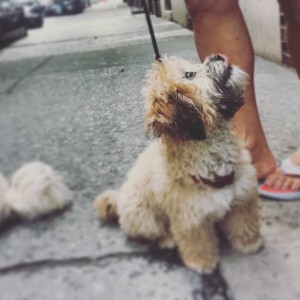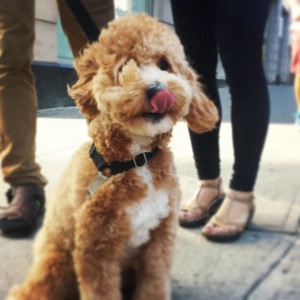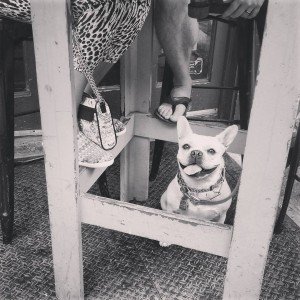When Can You Stop Feeding Puppy Food
There are special dog food options available for puppies. Whereas some brands offer dog food formulas suitable for all life stages. What's the difference between them and when exactly should you switch to adult dog food?
Moreover, if you're feeding all-life-stage food, what changes should you make to your dog's diet when it becomes an adult doggie? Knowing the answers to these questions is crucial because feeding patterns can go in a long way to your dog's health, well-being, and overall growth.
Why Do Dogs Need Different Diets as Puppies?

Petey the #littleshipoo is just #4months and growing in #cuteness everyday.
Dogs have different nutritional needs at different stages of their life. These are the basics of canine nutrition. Dogs as puppies need more nutrition and calories per pound of their body weight for faster and apt growth.
When puppies grow into adults, they have achieved a balanced skeletal structure and stopped growing. So if they continue eating puppy food as adults, they will ingest extra calories which could lead to other health problems. However, this isn't always the case because an adult dog's body tells him to reduce the amount of food. You may also start noticing unfinished food bowls when your pupper is finally transitioning into an adult doggo.
But you can't always rely on a dog's instincts. Some might find puppy food more palatable than adult food due to the high protein and fat contents in it. And continue enjoying it which may result in weight gain, obesity, and other related problems. Now you know why dogs need a different food when they turn into adults. But this again raises a question, how all-stage dog food works!
All high-quality industrial dog foods are tailored the way that they have nutritional value and calories stated by AAFCO for different stages of a dog's life. For instance, if a dog food is meant to feed a puppy, it should conform to AAFCO guidelines. These foods also contain supplements to ensure the dog gets the optimum nutrition in a puppy stage.
Now, all stage dog foods qualify for dogs of any age. But there's a catch here. The nutritional value remains the same but you're supposed to adhere to feeding recommendations. In a nutshell, the amount of food your pet needs to eat varies with its age.
So, feeding size is quite crucial in this case. Also, ensure you know how many cups in a pound of dog food there are. That way, you will be able to feed the exact amount of food required.
How to Decide When Your Puppy Needs To Switch to Adult Food

Zoey bringing the #glam.
There is no one-size-fits-all answer to this question. Each dog is unique and different and hence, you need to keep an eye on a few things. A puppy when entering into its adulthood will start eating significantly less amount of food. You may see unfinished meals more often. But that's not a sure-shot way to tell that your dog has now grown up. There's a popular saying that, watch your dog, not the dish. If you feel your puppy has formed a body of an adult dog, it's time.
The best way to know when to switch to adult dog food is to seek your vet's help. You don't have to immediately go to the vet for her advice. Whenever you visit the vet for regular health checkups or contact a consulting vet through a tele-vet service she will be able to tell when your pooch can switch to an adult dog food.
Large breed puppies need more time to stay on puppy food as they enter into adulthood a little later compared to medium and small dog breeds. Even if your puppy reaches to its adulthood age, he might not be ready to switch the food yet. More about puppy feeding in the upcoming section.
Feeding Puppies During First 6-12 Weeks
Like human babies, growing dog babies should be fed specially formulated food. Do not feed adult dog food as it can cause nutrient deficiency and be harmful to their health and well-being.
Small breed puppies should eat dried food till the age of 12 to 13 weeks whereas large breed dogs should continue it till 9 to 10 weeks.
Feeding Puppies During 3-6 Months
During this age, you can reduce your pup's mealtimes to thrice a day. You may see a reduction in their potbelly by the 12th week. But if she still is roly-poly at this stage, you should continue feeding small portions of food multiple times a day.
Feeding Puppies During 6–12 months

Feel like brunch for two or three? Bring your puppy!
By the age of 6 months, you can start feeding pups two portions a day. If you're considering spaying/neutering them, you may see a slight drop in their energy requirements. By the end of 12 months of age, you can switch from highly nutritious pup food to adult maintenance food.
But the age of switching food is not the same for all breeds. Small breed puppies can start having adult food from the age of 7 to 9 months. On the other hand, Bigger breeds can make the switch at 12, 13, or even 14 months.
However, if you're not sure when to switch, it's always better to feed puppy food a little more than switching to adult food earlier.
The Endnote
The transitioning to adult food should be smooth. Start with replacing 1/4th of your pup's food and stick to it for a week. Then, a half portion, 3/4th, and replace it completely over the period of a month.
It's an obvious question new pet parents ask. I've tried to explain puppy feeding in the simplest way possible. However, if you still find it difficult to understand when your dog should start eating adult dog food, you can simply ask this question to your vet.
Love our content? Share it with a friend or link it to social media. Like short clips of cute household pets? Training tips? Follow us on instagram @nydognanny or on YouTube at nydognanny. Have some news you needs to get to dog and cat parents stat? Email info@newyorkdognanny.com with your article pitch.
Source: https://www.newyorkdognanny.com/puppies/whats-the-right-time-to-stop-feeding-your-dog-puppy-food/
0 Response to "When Can You Stop Feeding Puppy Food"
Post a Comment